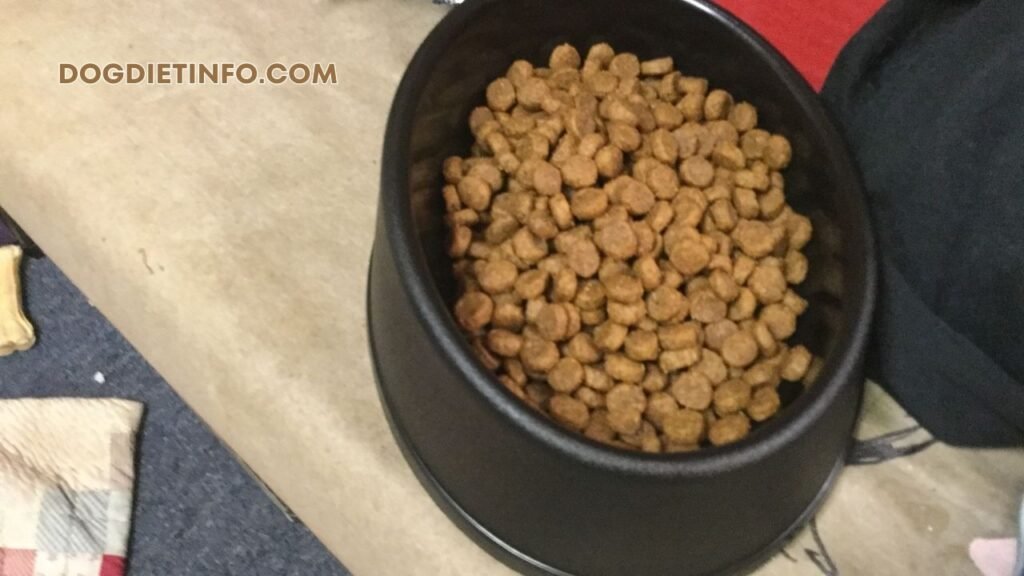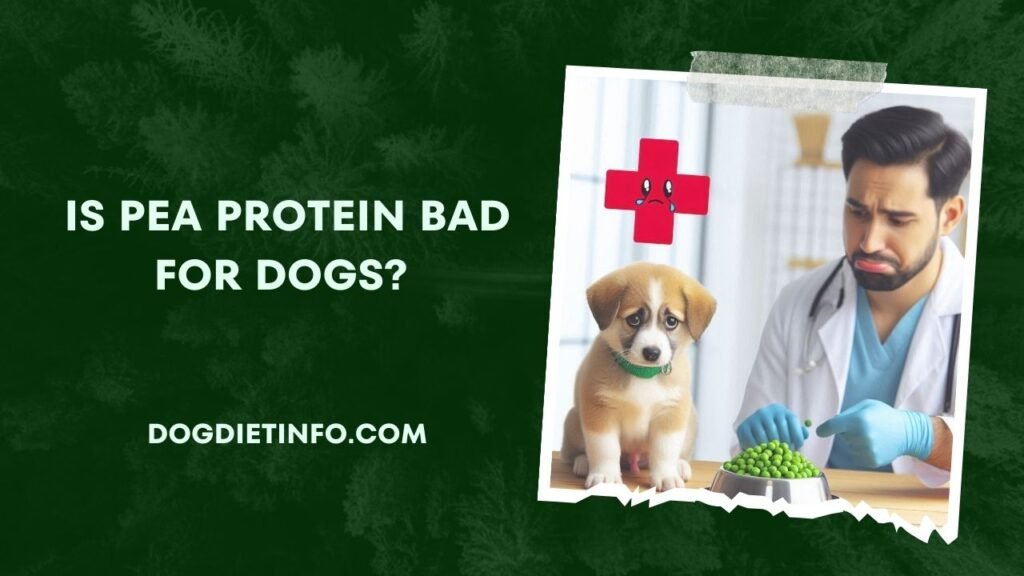Is Pea Protein Bad For Dogs? Pea protein is generally safe for dogs in moderation, but excessive amounts may contribute to potential health issues like heart disease.
Dog owners today are more informed and cautious about what they feed their pets than ever before.
As a result, questions about specific ingredients in dog food are becoming increasingly common. One such ingredient that has sparked discussion is pea protein.
It’s a plant-based protein that’s found in many commercial dog foods, particularly in grain-free varieties. But is pea protein good for your dog, or does it pose potential risks?
In this comprehensive guide, we’ll explore the benefits and concerns surrounding pea protein and whether it’s bad for dogs.
By the end of this article, you’ll have a better understanding of whether pea protein belongs in your dog’s diet. [Is Pea Protein Bad For Dogs?]
Contents
- 1 What Is Pea Protein?
- 2 Pea Protein in Human Food vs. Dog Food
- 3 Is Pea Protein Safe for Dogs?
- 4 Potential Benefits of Pea Protein for Dogs
- 5 Concerns Over Pea Protein in Dog Food
- 6 How Much Pea Protein Is Too Much for Dogs?
- 7 Alternatives to Pea Protein in Dog Food
- 8 The Importance of a Balanced Diet
- 9 Final Verdict
- 10 FAQs
- 11 Conclusion: Is Pea Protein Bad For Dogs?
What Is Pea Protein?
Pea protein is a protein extract derived from yellow or green split peas. The peas are ground into a fine powder, then the protein is isolated, creating a concentrated protein source that can be added to both human and pet food.
Pea protein has grown in popularity as a meat alternative in vegan and vegetarian diets and has also found a place in many commercial dog foods. Manufacturers favor it for its affordability and nutritional benefits.
Pea Protein in Human Food vs. Dog Food
In human food, pea protein is commonly used as a protein supplement for those following plant-based diets. It’s often found in protein shakes, energy bars, and meat substitutes.
In dog food, pea protein serves a similar function: to provide a concentrated source of protein, often in grain-free or limited-ingredient diets.
However, dogs are omnivores with different nutritional needs than humans, so it’s crucial to understand how this plant protein affects them.
Is Pea Protein Safe for Dogs?
For the most part, pea protein is considered safe for dogs when used in moderation.
It provides essential amino acids that help support muscle development and overall health. [Is Pea Protein Bad For Dogs?]
However, recent concerns have arisen about the inclusion of pea protein, particularly in grain-free diets, and its potential link to heart problems in dogs.
So, while it’s not inherently harmful, the amount and context of its use in your dog’s food are essential considerations.
Potential Benefits of Pea Protein for Dogs
Pea protein isn’t just a filler ingredient; it offers real nutritional benefits for dogs. Here’s why some pet food manufacturers include it in their formulations:
- Rich in Protein: Pea protein is a concentrated source of protein, which is essential for muscle maintenance and overall health. For dogs with food sensitivities or allergies to animal proteins, pea protein can be a good alternative.
- Low in Fat: Compared to some animal proteins, pea protein is naturally low in fat, making it an attractive option for dogs that require a low-fat diet, such as those with certain medical conditions like pancreatitis.
- Contains Essential Amino Acids: One of the standout features of pea protein is its high lysine content. Lysine is an essential amino acid that plays a critical role in calcium absorption and immune function, both of which are important for a dog’s health.
- Easily Digestible: Pea protein is more easily digested than other plant proteins, such as soy, which can be harder on a dog’s digestive system. This makes it a viable option for dogs with sensitive stomachs or food intolerances.
- Environmentally Friendly: For dog owners concerned about the environmental impact of meat production, pea protein is a more sustainable and eco-friendly source of protein. [Is Pea Protein Bad For Dogs?]
Concerns Over Pea Protein in Dog Food
While pea protein has its advantages, there are significant concerns regarding its use in dog food, particularly in large amounts. These concerns primarily revolve around its link to certain health issues in dogs.
1. Link to Dilated Cardiomyopathy (DCM):
One of the most talked-about issues related to pea protein is its potential link to dilated cardiomyopathy (DCM), a condition that affects the heart muscle’s ability to pump blood.
DCM is most often seen in large dog breeds, but in recent years, cases have been reported in breeds that aren’t typically prone to the disease.
Some of these cases have been linked to grain-free diets that contain high levels of legumes, including peas and lentils. [Is Pea Protein Bad For Dogs?]
While the FDA hasn’t made any definitive conclusions, it has raised concerns about the correlation between grain-free diets rich in peas and DCM.
The exact cause is still being researched, but it’s suggested that the high levels of legumes may interfere with the absorption of taurine, an amino acid vital for heart health.
2. Risks of Overconsumption:
Another concern is the over-reliance on pea protein in dog food. In some cases, pea protein can make up a significant portion of a dog’s diet, especially in grain-free formulations.
If pea protein is listed as one of the top ingredients in your dog’s food, it could indicate that it’s being used as a primary protein source.
While it provides protein, it may lack other essential nutrients that come from animal-based proteins.
3. FDA Investigations and Findings:
In 2018, the FDA announced it was investigating the potential connection between grain-free dog foods and DCM. [Is Pea Protein Bad For Dogs?]
While no direct cause has been confirmed, the FDA’s report noted that many of the affected dogs were eating diets high in peas, lentils, and other legumes.
As research continues, pet owners are advised to monitor their dog’s health and consult a vet if they have concerns about their dog’s food.

How Much Pea Protein Is Too Much for Dogs?
Moderation is key when it comes to pea protein in your dog’s diet. If your dog’s food lists pea protein among the first few ingredients, it could indicate that it makes up a significant portion of the food.
Look for dog foods that balance animal and plant proteins to provide a complete and balanced diet. [Is Pea Protein Bad For Dogs?]
Alternatives to Pea Protein in Dog Food
If you’re wary of pea protein or simply want to ensure your dog is getting a well-rounded diet, there are several alternatives to consider.
1. Animal Proteins:
Animal proteins such as chicken, beef, turkey, and lamb are highly digestible and provide all the essential amino acids dogs need. These proteins are typically better absorbed by dogs and contribute to overall health.
2. Fish-Based Proteins:
Fish like salmon, whitefish, and mackerel are excellent sources of protein and are rich in omega-3 fatty acids, which promote skin and coat health. For dogs with food allergies, fish can be a good alternative to traditional animal proteins.
3. Egg Protein:
Eggs are a highly digestible source of protein for dogs and are considered one of the best sources of complete protein. Many dog foods include eggs to enhance their protein content.
4. Plant-Based Alternatives:
While pea protein is one of the most common plant-based proteins in dog food, other options include lentils, chickpeas, and quinoa. These can be used in moderation, but it’s essential to ensure they are balanced with other protein sources.
The Importance of a Balanced Diet
When choosing dog food, it’s essential to consider your dog’s unique nutritional needs. [Is Pea Protein Bad For Dogs?]
Dogs are omnivores, which means they benefit from a combination of animal and plant-based foods.
A balanced diet that includes high-quality proteins, healthy fats, and essential vitamins and minerals will ensure that your dog gets everything they need to thrive.
Final Verdict
Pea protein is not inherently bad for dogs and can provide some nutritional benefits, such as being a digestible and low-fat protein source.
However, it should be used in moderation and as part of a balanced diet. The potential link between high levels of pea protein and heart disease (DCM) warrants caution, particularly for those feeding their dogs grain-free diets.
Consulting with your veterinarian is always the best approach to ensure your dog’s diet meets their unique health needs. [Is Pea Protein Bad For Dogs?]
In conclusion, while pea protein isn’t harmful when used appropriately, its overuse or reliance as a primary protein source in dog food could contribute to nutritional imbalances or health issues over time.
Keeping an eye on your dog’s diet and ensuring a balance of protein sources is key to maintaining their overall health. [Is Pea Protein Bad For Dogs?]
See Also: Is Chewing Gum Bad For Dogs?
FAQs
1.Can pea protein cause allergies in dogs?
Yes, like any ingredient, pea protein can potentially cause allergic reactions in some dogs. However, pea protein allergies are relatively uncommon compared to allergies to more common proteins like chicken or beef.
2. Is grain-free dog food safe for dogs?
Grain-free dog foods can be safe for some dogs, but they have been linked to potential health issues like DCM in others. Always consult a veterinarian before switching your dog to a grain-free diet.
3. What are the symptoms of DCM in dogs?
Symptoms of DCM include lethargy, coughing, difficulty breathing, fainting, and weakness. If your dog exhibits these symptoms, seek veterinary care immediately. [Is Pea Protein Bad For Dogs?]
4. How much protein does my dog need in their diet?
The amount of protein a dog needs depends on factors like age, size, breed, and activity level. Adult dogs typically need a diet containing around 18-25% protein, but active dogs or puppies may require more.
5. Should I avoid pea protein in my dog’s food altogether?
There’s no need to avoid pea protein entirely, but it’s essential to ensure it’s not the primary protein source in your dog’s diet. A well-balanced diet with a mix of protein sources is ideal.
Conclusion: Is Pea Protein Bad For Dogs?
Pea protein can be a beneficial ingredient in dog food when used in moderation, providing essential amino acids and a low-fat protein option.
However, it’s essential to be cautious about feeding your dog food that relies heavily on pea protein, particularly in grain-free diets.
The ongoing investigation into the potential link between pea protein and DCM means that pet owners should stay informed and consult with their veterinarians to ensure their dogs are getting a balanced, nutritious diet.
By doing so, you can ensure your furry friend remains happy, healthy, and full of energy.

Derrick Wilcox is a certified canine behaviorist with over 12 years of experience at Happy Paws Animal Clinic and Pawsitive Training Center, helping pet owners ensure safer, healthier, and happier lives for their dogs.



